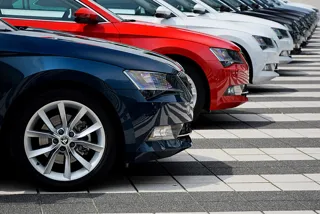Trade organisations have criticised aspects of the Government’s new benefit-in-kind tax regime, with ACFO describing it as “a token gesture” for the vast majority of company car drivers.
On Tuesday, the Government announced it was replacing the previously published rates for 2020/21 with figures for those driving a company car registered after April 6, 2020, and one for those driving a company car registered before April 6, 2020 (see below).
HM Treasury says that for cars first registered from April 6, 2020, most company car tax rates will be reduced by two percentage points.
While both ACFO and ICFM have welcomed that the changes mean company car drivers choosing a pure electric vehicle will pay no benefit-in-kind tax rates in 2020/21, both describe the overall announcement as a missed opportunity.
Caroline Sandall, director of ACFO, said: “The freezing of company car benefit-in-kind tax rates from 2020/21 for the vast majority of employees that already have a company car - or will be taking delivery of a new one prior to April 6, 2020 - is a token gesture.
“The rise from 2019/20 rates has not been cancelled.
“For employees taking a delivery of a company car from April 6, 2020 the two percentage point reduction in rates in 2020/21 and the one percentage point reduction in rates in 2021/22 before they equalise out in 2022/23 is unlikely to compensate for higher CO2 emissions as a result of WLTP testing.
“Indeed what might occur is that fleets and company car drivers may defer vehicle replacement for the remainder of 2019/20 and wait for the new lower tax rates to be introduced on April 6, 2020.
“The Government has acknowledged that evidence provided to it by the industry during the company car benefit-in-kind tax review showed that CO2 emission figures under WLTP testing were on average 20-25% higher than under the previous NEDC regime and in some cases up to 40% higher.
“It is ACFO’s belief that the reduction in rates for two years is unlikely to compensate drivers fully for the increase in emissions, although it will soften the blow.”
In its submission to the Government’s consultation on BIK rates, ACFO called for a four-year view of company car BIK tax thresholds to give employers and drivers certainty over future bills, but the new figures cover only up to April 2023.
Sandall added: “Amid a trend for longer vehicle replacement cycles, it is disappointing that the vast majority of drivers selecting a new company car today do not know what their tax bills will be for the whole operating cycle of the vehicle.
“ACFO is pleased that all 100% electric vehicles will be taxed at 0% for 2020/21 before rising by one percentage point in each of the following two financial years. However, again it is a token gesture.
“The number of zero emission cars currently available is miniscule and lead times are lengthy so the real value of the 0% rating will be extremely limited.
"Most major motor manufacturers have announced plans to introduce numerous plug-in models over the next 18 months and the Government needed to take account of model launches and availability in reforming company car benefit-in-kind tax.
“Consequently, for many drivers plug-in vehicles are not suitable and the arrival of WLTP emission figures means that on ‘normal’ petrol and diesel cars the tax burden, will in most cases, rise.
"The impact of the change in emission testing on some models is a rise of perhaps 25-30g/km on some models, which pushes those cars into tax bands several notches up than currently.
“Furthermore, most company car drivers choosing a diesel model will remain exposed to the four percentage point supplement applicable to those models as there remains a dearth of RDE2-compliant diesel cars on which the additional tax burden does not apply.
“The Government must understand that many company cars are ‘job-need’ with little vehicle choice. That means drivers of those vehicles, who will in many cases will be high-mileage where the diesel option is best for operational purposes and possibly lower salaried, have no cash allowance option and so a limited opportunity to reduce, or control, their benefit-in-kind tax.
“Overall, ACFO’s belief is that the changes announced are not sweeping enough.
“The Government had a real opportunity to take a hold and force change much quicker by incentivising the take-up of zero and ultra-low emission cars over the long term.
“However, it seems to have calculated the amount of money that it wanted to raise from company car benefit-in-kind tax and merely tweaked rates accordingly.”
ICFM 'relieved' at some BIK action
Paul Hollick, chairman of ICFM, said his organisation was relieved the Government has taken at least some action to limit company car drivers’ exposure to higher benefit-in-kind tax bills as a result of increased CO2 emissions figures under WLTP testing when compared to NEDC testing.
He added: “We had feared that the status quo would remain and thus the impact of higher CO2 emissions averaging 20-25% under WLTP would be ignored. So, this is welcome news although we were should really expect more.
“While the Government has slightly incentivised the take-up of zero emission models it has failed to take account of the lack of availability of those vehicles in today’s marketplace.
“For fleets and company car drivers to truly embrace the plug-in vehicle revolution, the Government needed to take account in reviewing tax rates of model launches and availability.
“Plug-in vehicles - and particularly zero emission models - remain a very niche product and what availability there is does not meet fleet and company car driver requirements in the majority of cases.
“That will change over the next two or three years as more models from mainstream manufacturers become available.
“Therefore, the Government needed to incentive the take-up of zero emission and plug-in vehicles through the benefit-in-kind tax regime over a much longer period of time as by April 2022 tax rates will be back to where they were at April 2020.”
'Will not stop people leaving company car schemes'
Both organisations fear not enough has been done to stop people opting out of company car schemes.
Sandall said: “Over the coming years the Government’s tax take from the company car sector is, ACFO believes, likely to increase.
“Therefore, far from the implementation of WLTP testing being tax neutral, as the Government initially indicated, it is likely to result in the company car remaining a ‘cash cow’.
“Consequently, more employees are likely to opt out of company cars despite the Government saying that it ‘recognised the value of the company car market in supporting the transition to zero emission technology’.
“That is undoubtedly counter-productive to the Government’s air quality improvement strategy and its push for take-up of zero and ultra-low emission cars to increase.
“Indeed, as ACFO told the Government employee migration away from company-provided cars to privately sourced cars is shown to increase CO2.
Hollick added: “The migration of employees out of company cars is well established as identified by HM Revenue and Customs’ data going back over many years.
“ICFM fears that the Government has not done enough in reviewing company car benefit-in-kind tax to either stop, slow down or reverse that trend.
“As a result, through its own company car benefit-in-kind tax strategy it is undermining one of its major policies - driving fleets towards a zero emission future.”
| Cars first registered before 6 April 2020 | ||||
|---|---|---|---|---|
| CO2 (g/km) | Electric range (miles) | 2020-21 (%) | 2021-22 (%) | 2022-23 (%) |
| 0 | N/A | 0 | 1 | 2 |
| 1-50 | >130 | 2 | 2 | 2 |
| 1-50 | 70-129 | 5 | 5 | 5 |
| 1-50 | 40-69 | 8 | 8 | 8 |
| 1-50 | 30-39 | 12 | 12 | 12 |
| 1-50 | <30 | 14 | 14 | 14 |
| 51-54 | 15 | 15 | 15 | |
| 55-59 | 16 | 16 | 16 | |
| 60-64 | 17 | 17 | 17 | |
| 65-69 | 18 | 18 | 18 | |
| 70-74 | 19 | 19 | 19 | |
| 75-79 | 20 | 20 | 20 | |
| 80-84 | 21 | 21 | 21 | |
| 85-89 | 22 | 22 | 22 | |
| 90-94 | 23 | 23 | 23 | |
| 95-99 | 24 | 24 | 24 | |
| 100-104 | 25 | 25 | 25 | |
| 105-109 | 26 | 26 | 26 | |
| 110-114 | 27 | 27 | 27 | |
| 115-119 | 28 | 28 | 28 | |
| 120-124 | 29 | 29 | 29 | |
| 125-129 | 30 | 30 | 30 | |
| 130-134 | 31 | 31 | 31 | |
| 135-139 | 32 | 32 | 32 | |
| 140-144 | 33 | 33 | 33 | |
| 145-149 | 34 | 34 | 34 | |
| 150-154 | 35 | 35 | 35 | |
| 155-159 | 36 | 36 | 36 | |
| 160+ | 37 | 37 | 37 |
* Add 4% for diesels up to a maximum of 37% (unless RDE2 compliant). Diesel plug-in hybrids are classed as alternative fuel vehicles, so the 4% diesel supplement does not apply to these vehicles irrespective of RDE2 compliance
| Cars first registered from 6 April 2020 | ||||
|---|---|---|---|---|
| CO2 (g/km) | Electric range (miles) | 2020-21 (%) | 2021-22 (%) | 2022-23 (%) |
| 0 | N/A | 0 | 1 | 2 |
| 1-50 | >130 | 0 | 1 | 2 |
| 1-50 | 70-129 | 3 | 4 | 5 |
| 1-50 | 40-69 | 6 | 7 | 8 |
| 1-50 | 30-39 | 10 | 11 | 12 |
| 1-50 | <30 | 12 | 13 | 14 |
| 51-54 | 13 | 14 | 15 | |
| 55-59 | 14 | 15 | 16 | |
| 60-64 | 15 | 16 | 17 | |
| 65-69 | 16 | 17 | 18 | |
| 70-74 | 17 | 18 | 19 | |
| 75-79 | 18 | 19 | 20 | |
| 80-84 | 19 | 20 | 21 | |
| 85-89 | 20 | 21 | 22 | |
| 90-94 | 21 | 22 | 23 | |
| 95-99 | 22 | 23 | 24 | |
| 100-104 | 23 | 24 | 25 | |
| 105-109 | 24 | 25 | 26 | |
| 110-114 | 25 | 26 | 27 | |
| 115-119 | 26 | 27 | 28 | |
| 120-124 | 27 | 28 | 29 | |
| 125-129 | 28 | 29 | 30 | |
| 130-134 | 29 | 30 | 31 | |
| 135-139 | 30 | 31 | 32 | |
| 140-144 | 31 | 32 | 33 | |
| 145-149 | 32 | 33 | 34 | |
| 150-154 | 33 | 34 | 35 | |
| 155-159 | 34 | 35 | 36 | |
| 160-164 | 35 | 36 | 37 | |
| 165-169 | 36 | 37 | 37 | |
| 170+ | 37 | 37 | 37 |
* Add 4% for diesels up to a maximum of 37% (unless RDE2 compliant). Diesel plug-in hybrids are classed as alternative fuel vehicles, so the 4% diesel supplement does not apply to these vehicles irrespective of RDE2 compliance






















The Engineer - 15/07/2019 08:47
Its not very fair. Due to the mess with WLTP, lack of revised vehicles available and tax clarity I have deferred and deferred ordering a replacement vehicle until I just could not wait any longer - I am currently driving a very tired and high mileage vehicle that has increasing issues and desperately needs replacing. When my new vehicle arrives in September I will now find that in just 6 months time my colleagues taking an identical vehicle will pay less BIK tax than me until 2022/23! How is WLTP and the manufacturers and government being so unprepared my fault? why am i being penalised? The new tax table should be retrospectively applied from when the new WLTP derived figures became applicable in September 2018. The 'Black hole' trap between Sept.2018 and April 2020 is ludicrously unfair on the innocent.